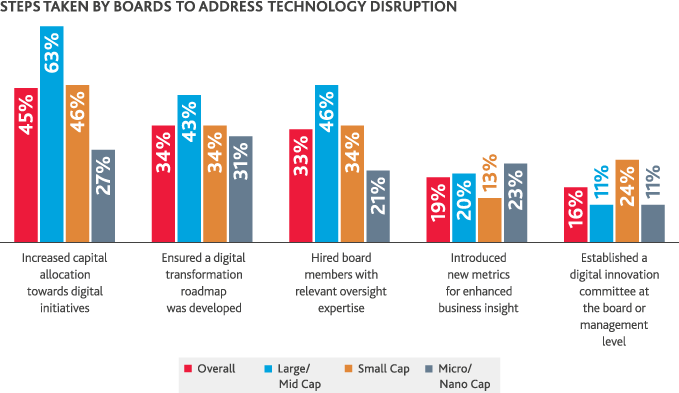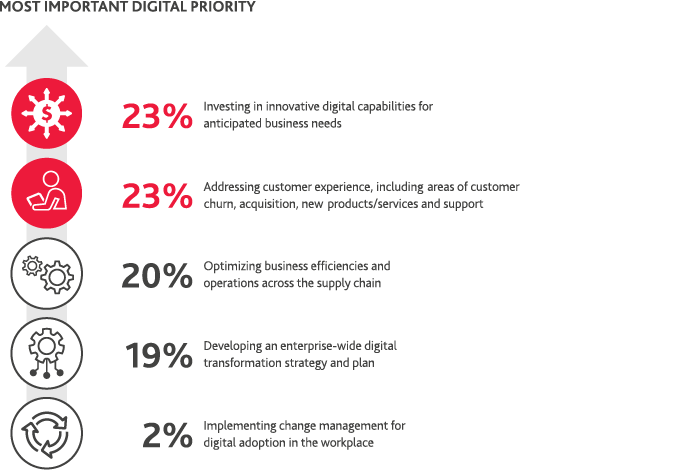Driving Digital Transformation
As technological innovation and disruption continue to reinvent the rules of business, board directors have ramped up their focus on digital transformation strategy.
Companies know that they need to pursue digital transformation not only to modernize and enhance their operations and processes, but also to enable data-driven insights that help inform business decision-making and increase profitability.
The writing is on the wall: According to the Bureau of Economic Analysis, the size of the digital economy is growing at a rate of 5.6%, compared to 1.5% growth for the overall economy.
In light of this business imperative, more than two-thirds (68%) of directors overall say they have a digital transformation strategy in place. Still, that means roughly one-third of companies have some catching up to do—most of which are small or micro/nano cap companies. Eighty-seven percent of large or mid cap companies have a digital transformation strategy in place, compared to 67% of small cap and 56% of micro/nano cap companies, respectively.
Among the directors who say their company has no digital transformation strategy in place, just about half plan to develop one.

Companies that do not move quickly and intentionally on digital transformation are likely to be left behind. Just under half (45%) of directors say they are increasing their investments in digital initiatives and 34% have a digital transformation roadmap developed to guide their strategy forward.
.png)
Directors were fairly even on pointing to investing in digital capabilities, enhancing the customer experience, boosting efficiencies and operations across the supply chain and developing an enterprise-wide digital transformation strategy and plan as top priorities.
One critical part of digital transformation that companies should not overlook is the change management required to truly integrate digital into the fabric of a business. Just two percent of directors say implementing change management for digital adoption in the workplace is their most important digital priority. While preparing your people for change may be backburnered in favor of solidifying digital strategy or focusing on revenue-generating or cost-saving digital investments, it’s critical that directors ensure any significant changes compliment an empowered workforce. Digital transformation is part culture and part technology.

Digital transformation is also fundamentally changing the skills and types of professionals that organizations need. For many companies, this means re-skilling and/or employing data scientists and engineers with deep technical expertise while ensuring leaders have deep digital knowledge for execution. Most board directors are championing investment in digital expertise, with 57% reporting they have actively encouraged the hiring of more professionals and executives with digital or technology backgrounds. However, this group is heavily skewed toward larger companies, with fewer than half of micro/nano cap companies actively investing in digital expertise compared to three-fourths of large/mid cap companies (41% and 78%, respectively).
“Competing in the digital economy requires becoming a digital business. But that process will be different for every organization based on their value opportunities and growth drivers. The board’s oversight of a company’s digital transformation journey is essential to reinvention and relevance.”
 MALCOLM COHRON
MALCOLM COHRONBDO USA’s National Digital Transformation Services Leader
SHARE